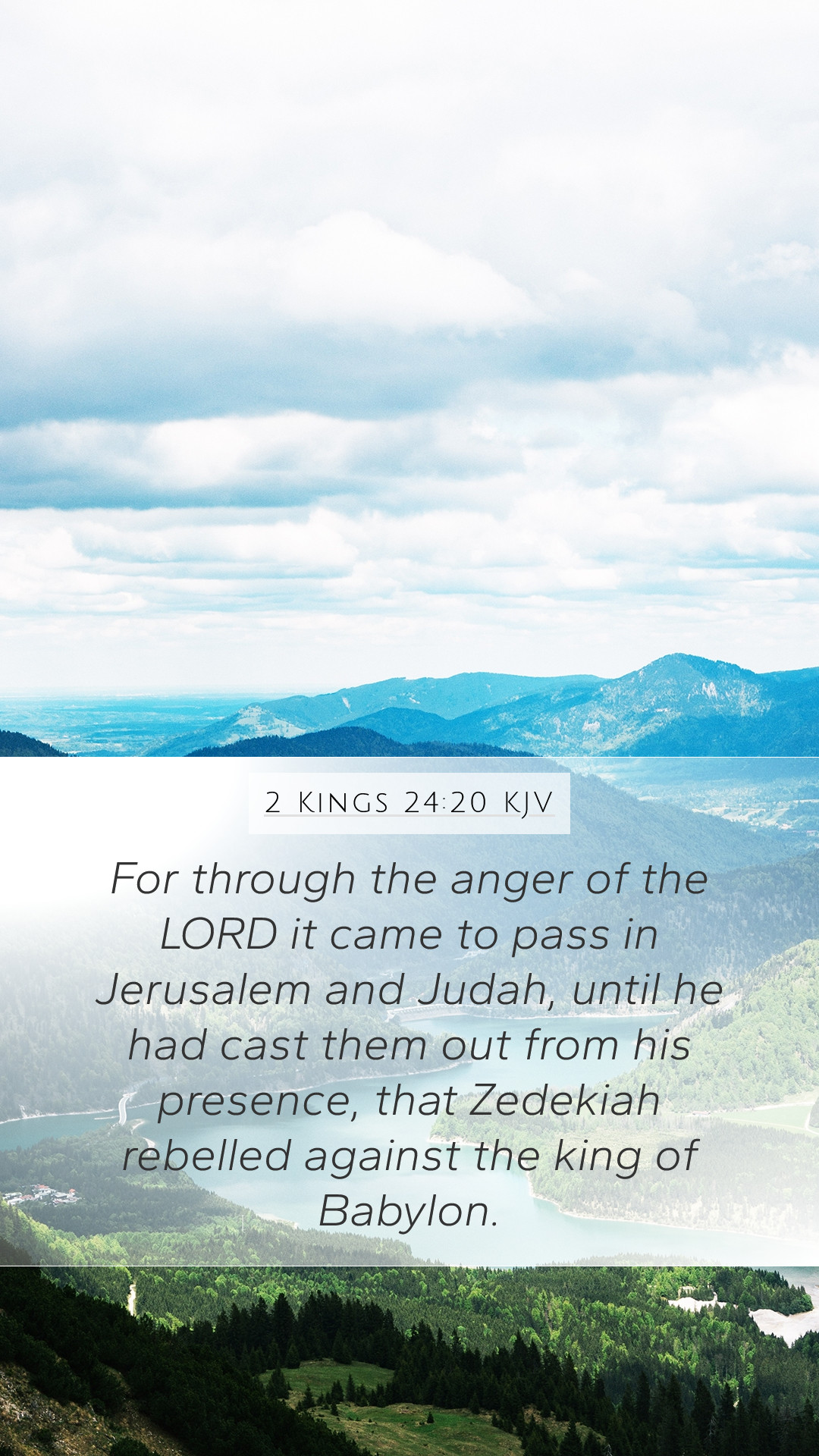Old Testament
Genesis Exodus Leviticus Numbers Deuteronomy Joshua Judges Ruth 1 Samuel 2 Samuel 1 Kings 2 Kings 1 Chronicles 2 Chronicles Ezra Nehemiah Esther Job Psalms Proverbs Ecclesiastes Song of Solomon Isaiah Jeremiah Lamentations Ezekiel Daniel Hosea Joel Amos Obadiah Jonah Micah Nahum Habakkuk Zephaniah Haggai Zechariah Malachi2 Kings 24:20 Meaning
What is the meaning of 2 Kings 24:20?
For through the anger of the LORD it came to pass in Jerusalem and Judah, until he had cast them out from his presence, that Zedekiah rebelled against the king of Babylon.
2 Kings 24:20 Bible Verse Meaning
Understanding 2 Kings 24:20
2 Kings 24:20 states: "For through the anger of the Lord it came to pass in Jerusalem and Judah, until he had cast them out from his presence, that Zedekiah rebelled against the king of Babylon."
This verse signifies a pivotal moment in the history of Judah, reflecting the broader themes of disobedience, divine judgment, and the consequences of rebellion against established authority. To gain a deeper understanding of this passage, we will explore its context, biblical interpretation, and key insights drawn from public domain commentaries by renowned scholars such as Matthew Henry, Albert Barnes, and Adam Clarke.
Contextual Background
The historical backdrop of 2 Kings 24:20 is essential for interpreting its meaning. This passage occurs during a time of significant turmoil in Judah. After a series of kings who failed to adhere to God's commandments, God's anger is now directed towards His people, leading to their eventual exile. Understanding this context highlights the principle that the actions and decisions of leaders impact the entire nation.
Bible Verse Interpretations
-
Matthew Henry's Commentary:
Matthew Henry emphasizes the sovereignty of God and the gravity of sin as reasons for Judah's downfall. He notes that the people's rebellion against God culminated in divine wrath, culminating in their exile. Henry suggests that Zedekiah's rebellion signifies the ultimate consequence of disobedience, indicating that when leaders stray, they lead others into destruction.
-
Albert Barnes' Notes:
Barnes posits that Zedekiah's rebellion was a culmination of a long history of defiance against Babylonian rule. He explains that this act not only led to Zedekiah’s downfall but also signaled the end of Judah’s political autonomy. Barnes articulates that this reflects a broader message about the futility of resisting God's established order.
-
Adam Clarke's Commentary:
Clarke presents an analysis of Zedekiah’s character, describing him as weak and indecisive. He points out that Zedekiah's failure to adhere to God's word, and his subsequent rebellion against Babylon, illustrate the tragic consequences of a leader who lacks conviction. Clarke stresses that this verse serves as a warning against the folly of resisting God’s determined decrees.
Key Themes and Insights
Several key themes emerge from 2 Kings 24:20 and the associated commentaries:
-
Divine Judgment:
God's anger is a central theme in this passage. The consequences of sinning against God are serious and can lead to national devastation, as evidenced by the fate of Jerusalem and Judah.
-
Rebellion Against Authority:
Zedekiah's rebellion represents a willful disregard for authority, both divine and earthly. This serves as a significant lesson about the importance of obedience and the repercussions of uprising against rightful leadership.
-
Historical Consequences:
The historical context allows for a better understanding of the long-term effects of the actions taken by Israel's leaders. The people’s fate is intertwined with their leaders' spiritual and moral decisions.
Application of 2 Kings 24:20 in Daily Life
Understanding this verse is not only about historical context but also its application for modern believers. It serves as a cautionary reminder of the significance of adhering to God's will and the dangers of leadership that deviates from holy principles.
-
Leadership Responsibility:
Leaders today can draw lessons from Zedekiah's failure, recognizing their responsibility to guide others towards righteousness and the potential consequences when they falter.
-
The Importance of Obedience:
Individuals are encouraged to evaluate their own lives regarding obedience to God and consider the wider implications of their actions in community and fellowship.
Cross References
This verse relates to several other passages in Scripture, reinforcing its themes:
- Jeremiah 39:1-10: The description of Jerusalem's fall and Zedekiah’s fate.
- Ezekiel 12:10-13: Prophecies concerning Zedekiah's capture.
- Proverbs 29:2: The principle that when the righteous are in authority, the people rejoice.
In conclusion, 2 Kings 24:20 serves as a profound scripture that encapsulates the struggles of Judah under Zedekiah’s leadership, revealing the severe implications of sinful defiance against God. Through comprehensive analysis and reflection, readers can engage in a deeper understanding of the text and its applications in both ancient and contemporary settings.


